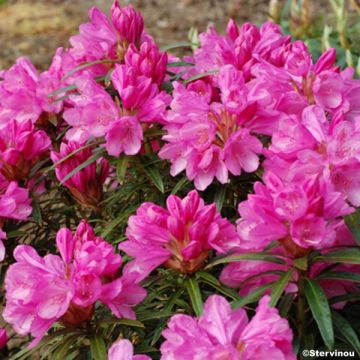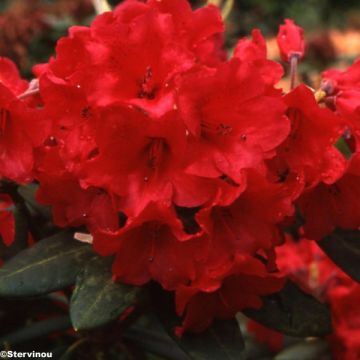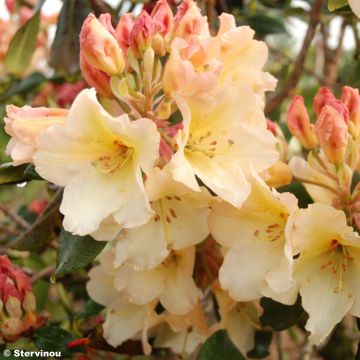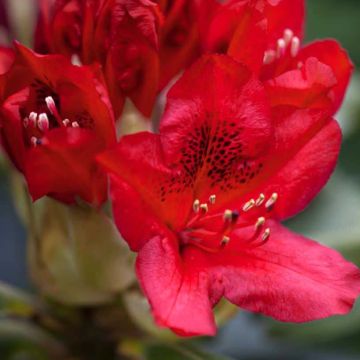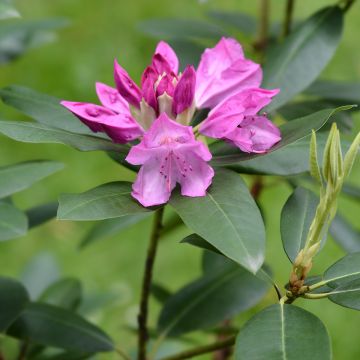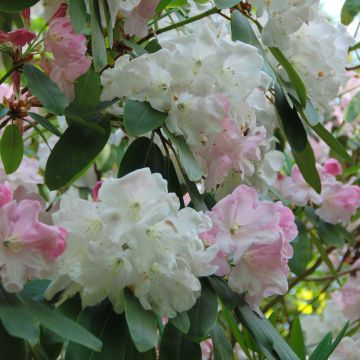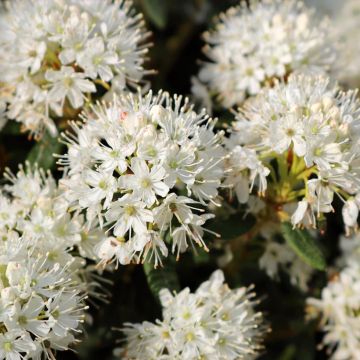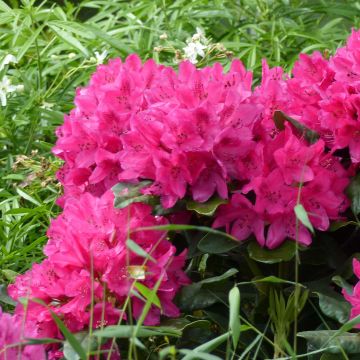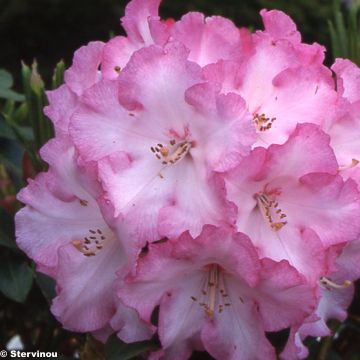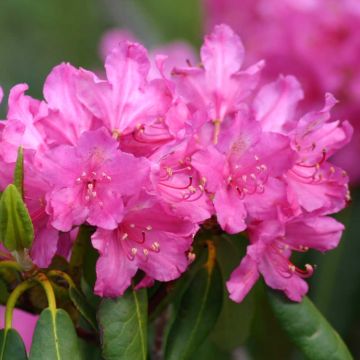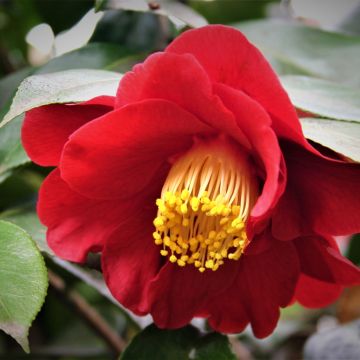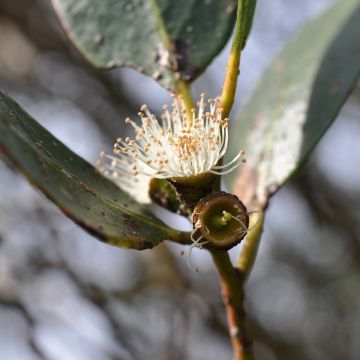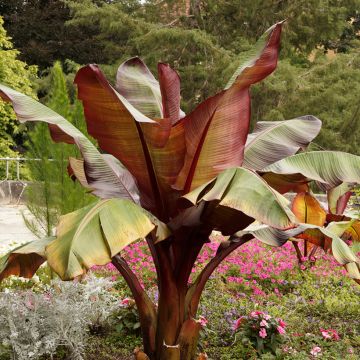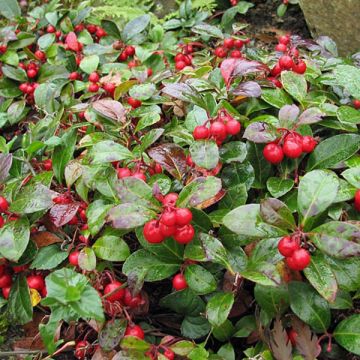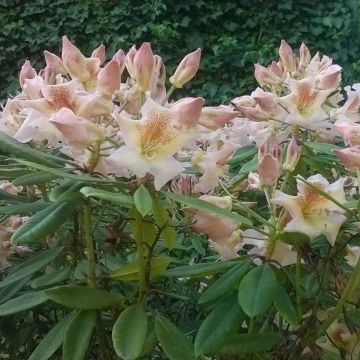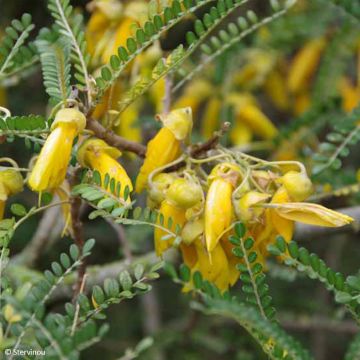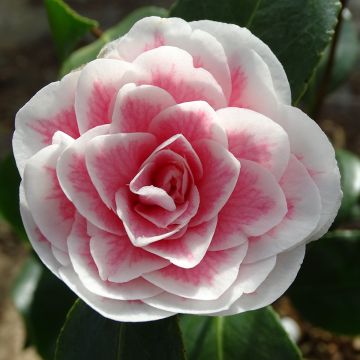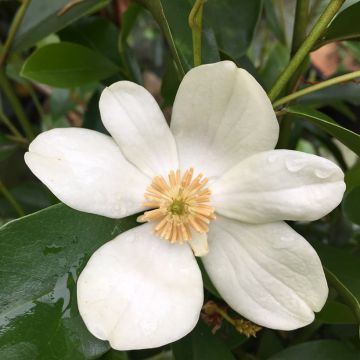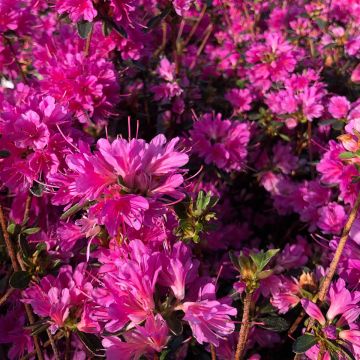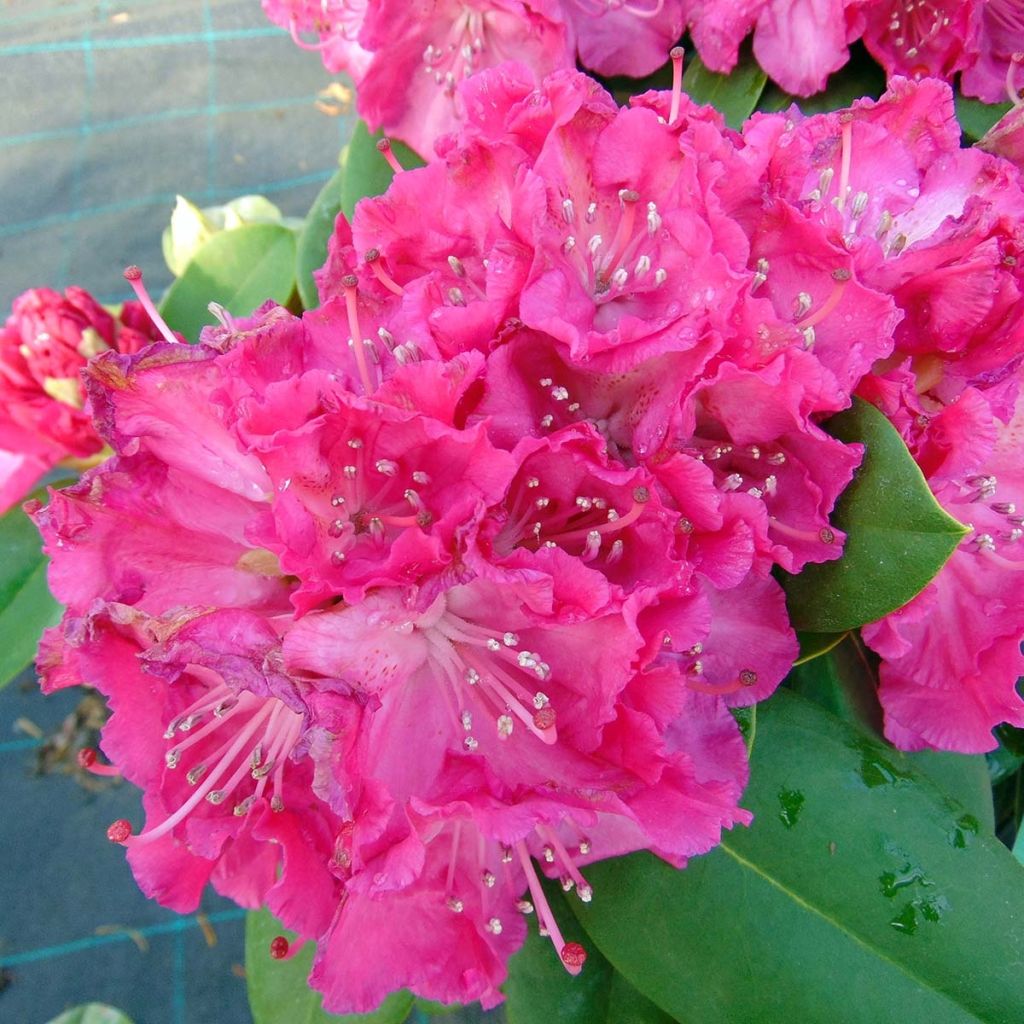

Rhododendron Germania
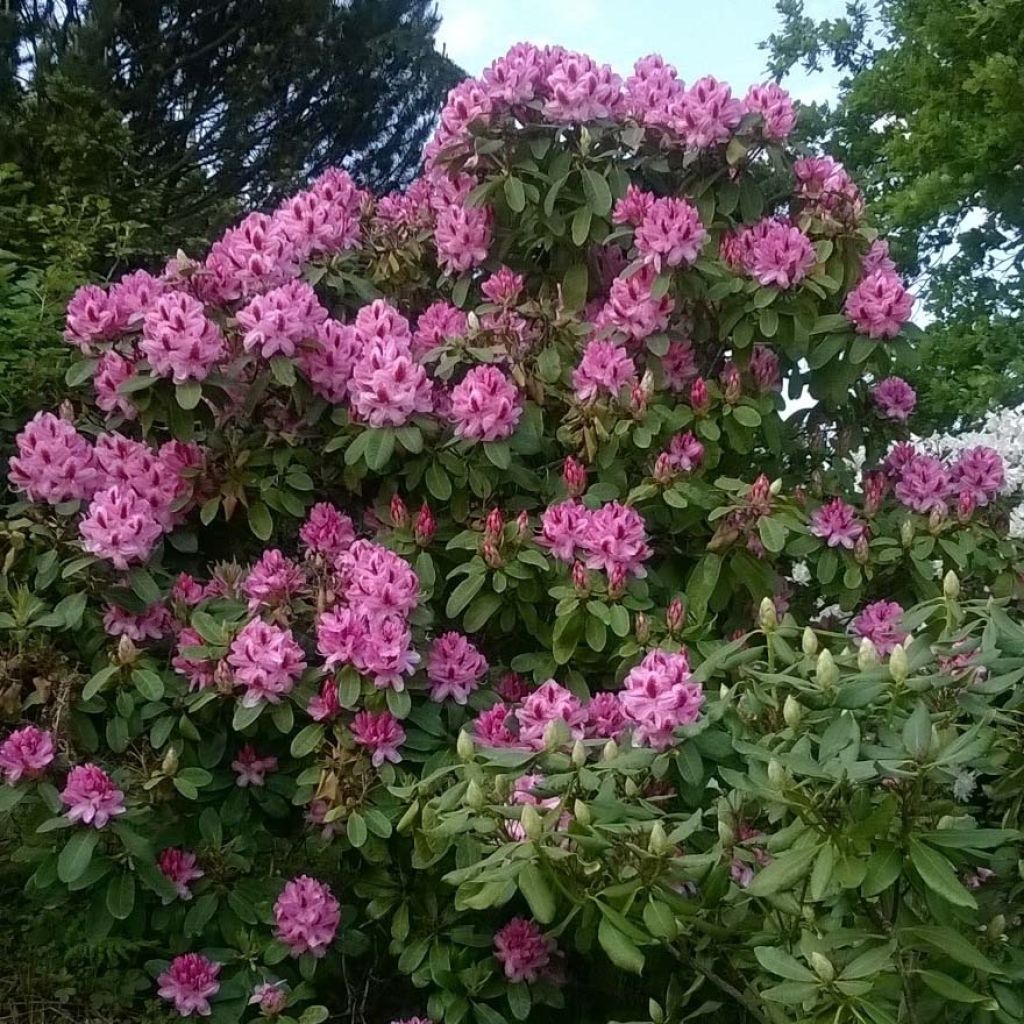

Rhododendron Germania
Rhododendron Germania
Rhododendron Germania
Rhododendron hybride
This item cannot be shipped to the selected country
Delivery charge from €5.90
More information
Schedule delivery date,
and select date in basket
This plant carries a 24 months recovery warranty
More information
We guarantee the quality of our plants for a full growing cycle, and will replace at our expense any plant that fails to recover under normal climatic and planting conditions.
From €5.90 for pickup delivery and €6.90 for home delivery
Express home delivery from €8.90.

Does this plant fit my garden?
Set up your Plantfit profile →
Description
Rhododendron 'Germania' is an old hybrid obtained in Germany, still widely planted in our gardens, but also in large pots to decorate patios and balconies. It naturally forms a large round shrub with dense vegetation, and in spring it is covered with large frilly flowers in a deep pink that bring the garden to life even in the early days of spring. Decorative throughout the year, this evergreen shrub is cultivated in ericaceous soil, in partial shade or even in the morning sun if the soil remains damp. A reliable choice!
Rhododendrons are plants in the Ericaceae family, just like heathers, and they prefer soils without limestone, with an acidic tendency, and wet climates. Derived from the hybridisation of the varieties 'Anton Van Velie' and 'Catherine Van Tol', Rhododendron 'Germania' was obtained in Germany in 1979 and remains one of the most popular cultivars to this day. It forms a dense, rounded, slightly spreading bush, reaching an average height of 1.5 metres (5 feet) with a 2-metre (7 feet) spread at maturity. It grows rather slowly, generally reaching 1 metre (3 feet) in height with a 1.2-metre (4 feet) spread at 10 years old. Its large, dark green glossy evergreen leaves are elliptical in shape and cover the plant well. They have a very fuzzy underside. From April to June, depending on the region, for about 3 weeks, a remarkably abundant flowering submerges the bush, with 12 to 19 funnel-shaped flowers grouped in corymbs, starting as red-pink buds and opening in a palette of very bright pink tones, deeper at the edges and lighter in the throat. The petals of 'Germania' have frilly edges and open to reveal pink stamens.
Rhododendron 'Germania' is a flowering plant that is very hardy, tolerating temperatures down to -15°C (5°F). Although they prefer partial shade, hybrid rhododendrons can withstand the morning sun as long as it is not too intense and their roots remain damp. 'Germania', with its abundant and vibrant flowering, will easily decorate a small shaded space in the garden, alongside ferns, blue or variegated hostas, Pieris, heathers, Kalmias, Azaleas, Japanese Maples, or other rhododendrons from the same group to create stunning patchworks of textures and colours in spring. Rhododendrons can also be used to create beautiful hedges, on their own, or with camellias or mimosas (in mild climates), for example. Cultivating them in pots requires regular watering with non-calcareous water and specific fertilizer for plants in ericaceous soil.
Report an error about the product description
Rhododendron Germania in pictures
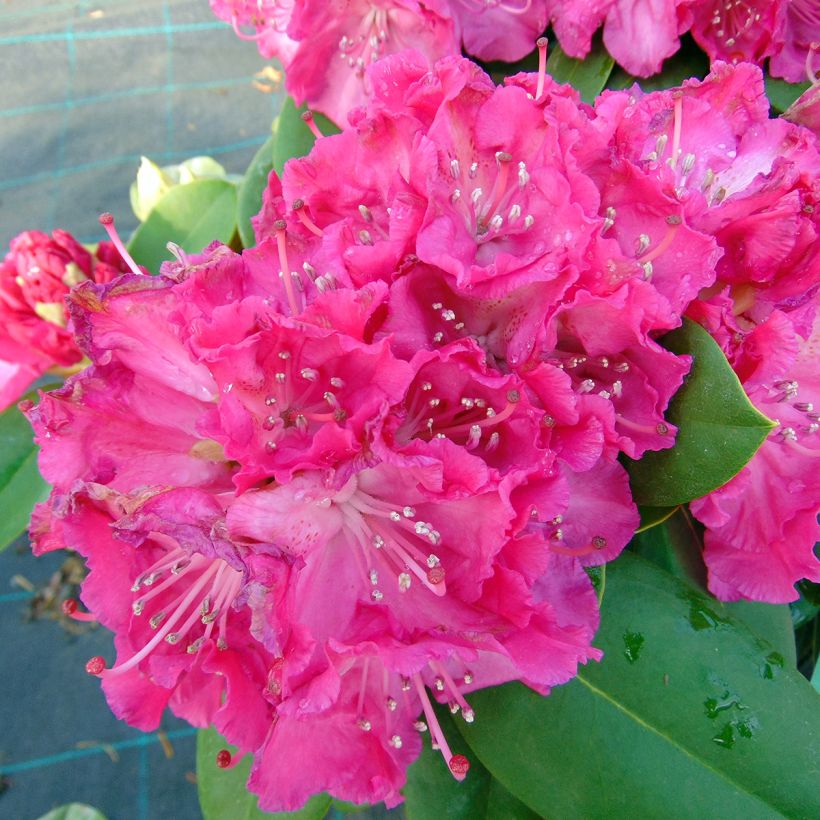

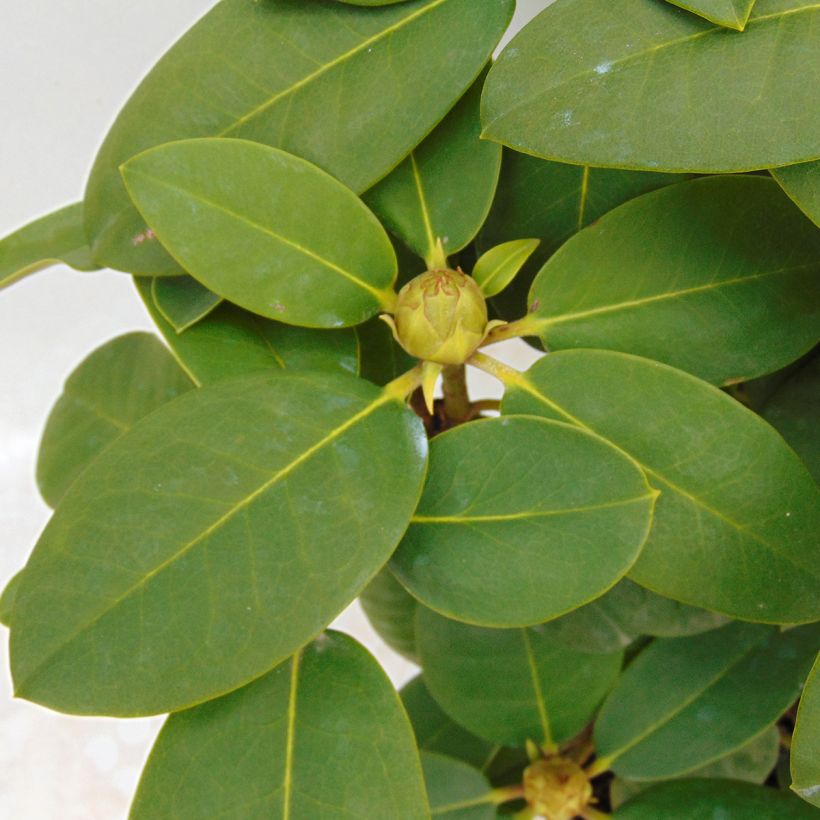



Plant habit
Flowering
Foliage
Botanical data
Rhododendron
Germania
Ericaceae
Rhododendron hybride
Cultivar or hybrid
Other Large Rhododendrons
Planting and care
Plant the Rhododendron 'Germania' in a semi-shaded position, protected from cold and drying winds, in a damp, humus-rich, and light soil with an acidic tendency. Like all plants in the heath family, it does not tolerate limestone soils or heavy soils saturated with water in winter. Dig a hole three times larger than the pot. Soak the root ball in non-calcareous water and plant the shrub at the level of the collar, in a mixture composed of 1/4 compost, humus, gravel or pumice, and loam. Water generously and keep the soil moist in summer.
Azaleas and Rhododendrons have a shallow and relatively limited root system. Therefore, they are sensitive to long periods of drought. That is why it is recommended to enrich the soil with humus beforehand and water abundantly with non-calcareous water during dry periods. In addition, this root system is not very strong, which is why it is essential to lighten heavy soils with draining materials (gravel, pumice, clay pellets) when planting. Apply a mulch of shredded pine bark around the base of the bush every spring to maintain soil moisture while keeping an acidic pH.
Maintenance involves removing old faded flowers in summer using pruning shears and clearing the plant of dead branches. Azaleas and Rhododendrons can sometimes be attacked by weevils that eat the edges of leaves and rootlets, as well as the infamous "rhododendron beetle" which does not often cause significant damage. Yellowing of the leaves (chlorosis) in Rhododendrons indicates poor iron assimilation in the soil and can lead to the premature death of the plant. While limestone is generally the cause, poorly-drained soil or deeply planted root balls can also explain the phenomenon.
Planting period
Intended location
Care
-
, onOrder confirmed
Reply from on Promesse de fleurs
Evergreen shrubs
Haven't found what you were looking for?
Hardiness is the lowest winter temperature a plant can endure without suffering serious damage or even dying. However, hardiness is affected by location (a sheltered area, such as a patio), protection (winter cover) and soil type (hardiness is improved by well-drained soil).

Photo Sharing Terms & Conditions
In order to encourage gardeners to interact and share their experiences, Promesse de fleurs offers various media enabling content to be uploaded onto its Site - in particular via the ‘Photo sharing’ module.
The User agrees to refrain from:
- Posting any content that is illegal, prejudicial, insulting, racist, inciteful to hatred, revisionist, contrary to public decency, that infringes on privacy or on the privacy rights of third parties, in particular the publicity rights of persons and goods, intellectual property rights, or the right to privacy.
- Submitting content on behalf of a third party;
- Impersonate the identity of a third party and/or publish any personal information about a third party;
In general, the User undertakes to refrain from any unethical behaviour.
All Content (in particular text, comments, files, images, photos, videos, creative works, etc.), which may be subject to property or intellectual property rights, image or other private rights, shall remain the property of the User, subject to the limited rights granted by the terms of the licence granted by Promesse de fleurs as stated below. Users are at liberty to publish or not to publish such Content on the Site, notably via the ‘Photo Sharing’ facility, and accept that this Content shall be made public and freely accessible, notably on the Internet.
Users further acknowledge, undertake to have ,and guarantee that they hold all necessary rights and permissions to publish such material on the Site, in particular with regard to the legislation in force pertaining to any privacy, property, intellectual property, image, or contractual rights, or rights of any other nature. By publishing such Content on the Site, Users acknowledge accepting full liability as publishers of the Content within the meaning of the law, and grant Promesse de fleurs, free of charge, an inclusive, worldwide licence for the said Content for the entire duration of its publication, including all reproduction, representation, up/downloading, displaying, performing, transmission, and storage rights.
Users also grant permission for their name to be linked to the Content and accept that this link may not always be made available.
By engaging in posting material, Users consent to their Content becoming automatically accessible on the Internet, in particular on other sites and/or blogs and/or web pages of the Promesse de fleurs site, including in particular social pages and the Promesse de fleurs catalogue.
Users may secure the removal of entrusted content free of charge by issuing a simple request via our contact form.
The flowering period indicated on our website applies to countries and regions located in USDA zone 8 (France, the United Kingdom, Ireland, the Netherlands, etc.)
It will vary according to where you live:
- In zones 9 to 10 (Italy, Spain, Greece, etc.), flowering will occur about 2 to 4 weeks earlier.
- In zones 6 to 7 (Germany, Poland, Slovenia, and lower mountainous regions), flowering will be delayed by 2 to 3 weeks.
- In zone 5 (Central Europe, Scandinavia), blooming will be delayed by 3 to 5 weeks.
In temperate climates, pruning of spring-flowering shrubs (forsythia, spireas, etc.) should be done just after flowering.
Pruning of summer-flowering shrubs (Indian Lilac, Perovskia, etc.) can be done in winter or spring.
In cold regions as well as with frost-sensitive plants, avoid pruning too early when severe frosts may still occur.
The planting period indicated on our website applies to countries and regions located in USDA zone 8 (France, United Kingdom, Ireland, Netherlands).
It will vary according to where you live:
- In Mediterranean zones (Marseille, Madrid, Milan, etc.), autumn and winter are the best planting periods.
- In continental zones (Strasbourg, Munich, Vienna, etc.), delay planting by 2 to 3 weeks in spring and bring it forward by 2 to 4 weeks in autumn.
- In mountainous regions (the Alps, Pyrenees, Carpathians, etc.), it is best to plant in late spring (May-June) or late summer (August-September).
The harvesting period indicated on our website applies to countries and regions in USDA zone 8 (France, England, Ireland, the Netherlands).
In colder areas (Scandinavia, Poland, Austria...) fruit and vegetable harvests are likely to be delayed by 3-4 weeks.
In warmer areas (Italy, Spain, Greece, etc.), harvesting will probably take place earlier, depending on weather conditions.
The sowing periods indicated on our website apply to countries and regions within USDA Zone 8 (France, UK, Ireland, Netherlands).
In colder areas (Scandinavia, Poland, Austria...), delay any outdoor sowing by 3-4 weeks, or sow under glass.
In warmer climes (Italy, Spain, Greece, etc.), bring outdoor sowing forward by a few weeks.

































